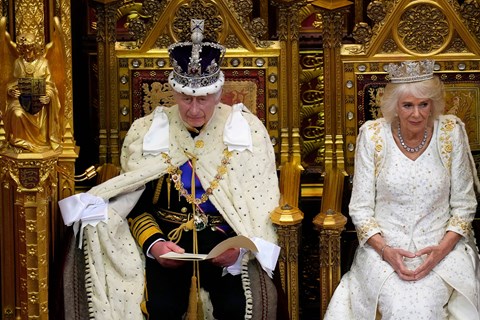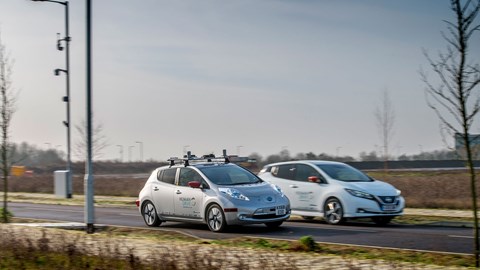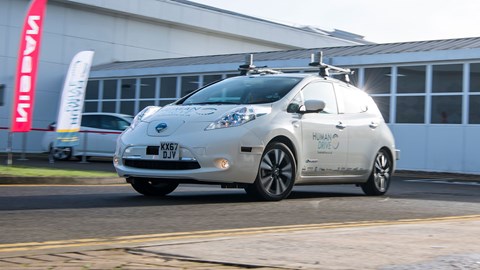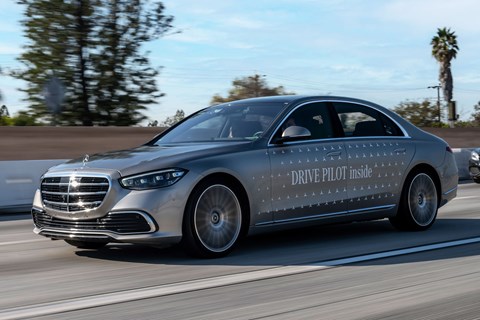► King’s Speech: prep for Automated Vehicles Bill
► Sets legal framework for self-driving cars
► Car makers, not drivers, will be legally liable
The groundwork for the UK’s new Automated Vehicles Bill has kicked off after the King’s Speech laid the ground for sweeping new laws preparing Britain’s roads for the autonomous driving revolution.
It will set out the legal framework for self-driving cars and it is becoming clear that car makers, not owners, will shoulder the legal responsibility for any crashes in the UK involving autonomous vehicles.
King Charles III said the government will introduce the Automated Vehicle Bill in the next parliament, as he set out the Conservatives’ legislative agenda.
What does the Automated Vehicles Bill say?
The laws being prepared by the Conservative government will usher in fines for companies whose self-driving cars are found to be at fault in the event of an accident; drivers will be given immunity from prosecution. ‘While the vehicle is driving itself, a company rather than an individual will be responsible for the way it drives,’ the government said.

The bill will also ban misleading marketing, meaning that only vehicles that meet required safety standards can be marketed as self-driving – a move which many observers noticed might unsettle Tesla, whose Autopilot assistance system is sometimes confused with a full self-driving option.
Expect further focus on standardised road markings on key trunk and commuting roads. Most autonomous cars require clear white lines and road signs to operate safely.
Why the self-driving legislation is so important
Car makers and motorists alike need utter clarity to safely adopt autonomous driving tech – and that’s the legal purpose of the Automated Vehicles Bill. Insurance companies and the automotive industry welcomed the framework and claimed it would bolster investment in the UK.
Tara Foley, the UK operations chief at insurance giant AXA, said: ‘For insurers, it also provides crucial clarity for establishing liability for self driving.’
The government hopes the bill will decrease the chance of legal loopholes experienced in other territories. GM’s driverless car unit Cruise was last month ordered to remove its autonomous prototypes from the roads of California after the state accused it of ‘misrepresenting’ its tech’s ability.
Autonomous cars in the UK: a quick history
Self-driving cars have become a big problem for UK legislators. There are a couple of cars on sale today (such as the Tesla Model S and Mercedes EQS) which could soon drive without human intervention – but full self-driving systems aren’t legal to use on UK roads just yet.
The Department for Transport has been pondering the full gamut of AV tech for years: from simple cruise control to automated lane-keeping (ALKS) systems which can control the position of the vehicle in a single lane. Each step of automation is rated on a scale from Level 1 (simple control of one parameter, eg cruise control) to Level 5 (full hands-off self-driving).
It might sound like the UK government is dragging its heels on the matter – but one of the main reasons for not rolling out the technology with greater enthusiasm is because lawmakers haven’t created a good enough set of rules for accountability when it all goes wrong.

Most importantly, this distinction has the capacity to remove responsibility from the driver in the event of an accident. So, if a car that falls into the former camp is involved in a crash (and the car or the driver can prove that self-driving features were active at the time) the legal accountability for the collision would fall to the manufacturer or the insurance company.
Naturally, this will also mean that a system will need to be added to self-driving cars which logs when the autonomous mode is active and relays information back to the manufacturer if any unsafe driving occurs during its uptime to help eliminate the bugs.
Could my car be prosecuted for motoring offences, then?
If the Law Commissions get their way, yes. But whether the car makers will pay the fines is another matter altogether. The proposal suggests that whoever’s sat in the driving seat would be immune from prosecution for offences such as exceeding the speed limit or running red lights when the car’s self-driving system is active. That’s because they’re no longer driving – they’d be a ‘user-in-charge.’
The driver/owner could still get booked for offences that don’t involve driving, though. So, they’d still be responsible for ensuring their vehicle is taxed, insured and MOT’d. It’d also be up to the human driver to make sure that any children on board have their seatbelts fastened and any loads are secured in place before setting off.

Drivers could also be allowed to watch television in their cars once fully autonomous cars are rolled out, providing they retake control of the car when asked. Crucially though, they won’t be able to use their mobile phones.
That’s because manufacturers can implement a system that automatically turns off the content being watched on the infotainment screen when the driver needs to retake control, forcing them to divert their attention back to the road. You can’t police a separate handheld device.
What have safety regulators got to say about the matter?
The renowned safety body Thatcham was consulted as part of the Commissions’ report. The company’s chief research strategy officer, Matthew Avery, said: ‘The transition to safe introduction of automation with self-driving capabilities is fraught with risk as we enter the early stages of adoption. Today’s report is a significant step, as it provides important legal recommendations and clarity for the safe deployment of vehicles with self-driving features onto the UK’s roads.
‘In the next 12 months, we’re likely to see the first iterations of self-driving features on cars on UK roads. It’s significant that the Law Commission report highlights driver’s legal obligations, and they understand that their vehicle is not yet fully self-driving. It has self-driving features that, in the near future, will be limited to motorway use at low speeds.’
Mercedes accepts responsibility for accidents caused by its self-driving system
This was a significant legislative step towards getting autonomous cars on the road. Mercedes is gearing up to launch its new Level 3 self-driving technology on the new S-Class and EQS saloons – and, in early 2022, the brand confirmed that it was prepared to take the blame for accidents involving its cars when the self-driving system is engaged.
However, the company’s acceptance of liability falls within a limited set of parameters. Mercedes says it will only take the blame for an accident if it was directly caused by a fault with its technology. If the driver “fails to comply with their duty of care” (such as refusing to retake control of the car when prompted), they will be responsible for the resulting damage.
From launch, Mercedes’s Drive Pilot system will only work within geo-fenced areas on the German motorway network at speeds up to 60km/h (around 37mph) – but these limitations could be lifted once Mercedes has proved to legislators that the system works reliably.

As Drive Pilot is a Level 3 system, the driver will be able to take their hands off the wheel and allow the car to assume total control of its functions. Mercedes even says that owners will be able to perform “ancillary tasks” on the car’s infotainment system, such as replying to emails, watching a film or online shopping. Smartphones aren’t allowed for reasons mentioned above.
Mercedes is the first manufacturer in the world to meet the legal requirements for a Level 3 self-driving system, beating the autonomous pioneer Tesla to the punch. The German government granted Mercedes approval for the technology in late 2021 – and the first cars equipped with Drive Pilot went on sale in early 2022.